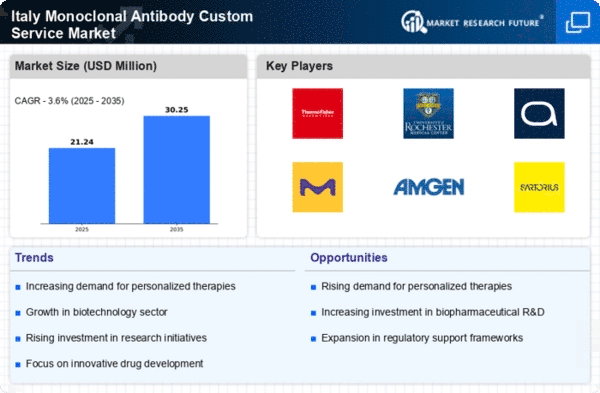Growing Demand for Diagnostic Tools
The monoclonal antibody-custom-service market is witnessing a growing demand for diagnostic tools, particularly in the context of precision medicine. As healthcare providers in Italy increasingly adopt personalized approaches to treatment, the need for accurate and reliable diagnostic solutions becomes paramount. In 2025, the market for diagnostic monoclonal antibodies is expected to grow by 15%, reflecting the rising emphasis on early detection and tailored treatment strategies. Custom services that can develop specific antibodies for diagnostic purposes are becoming essential, as they enable healthcare professionals to make informed decisions based on individual patient profiles. This trend not only enhances patient care but also drives the growth of the monoclonal antibody-custom-service market, as companies strive to meet the evolving needs of the healthcare sector.
Advancements in Research Capabilities
The monoclonal antibody-custom-service market is benefiting from significant advancements in research capabilities within Italy. The integration of cutting-edge technologies, such as CRISPR and high-throughput screening, is revolutionizing the development and customization of monoclonal antibodies. In 2025, it is anticipated that research institutions will increase their output of novel antibodies by 25%, driven by these technological innovations. This enhancement in research efficiency not only accelerates the development process but also improves the quality of custom services offered. As a result, pharmaceutical companies are increasingly relying on these advanced research capabilities to create more effective and targeted therapies. The ongoing evolution of research methodologies is likely to play a pivotal role in shaping the future of the monoclonal antibody-custom-service market, fostering a more dynamic and responsive industry.
Rising Prevalence of Chronic Diseases
The increasing incidence of chronic diseases in Italy is a critical driver for the monoclonal antibody-custom-service market. Conditions such as cancer, autoimmune disorders, and infectious diseases are on the rise, necessitating the development of targeted therapies. In 2025, it is estimated that around 30% of the Italian population will be affected by chronic illnesses, creating a substantial demand for innovative treatment options. Monoclonal antibodies have shown promise in addressing these health challenges, leading to a heightened interest in custom services that can tailor these therapies to individual patient needs. This trend indicates a shift towards personalized medicine, where treatments are designed based on specific disease profiles, thereby enhancing efficacy and patient outcomes. Consequently, the market is likely to expand as healthcare providers seek advanced solutions to combat the growing burden of chronic diseases.
Increasing Investment in Biopharmaceuticals
The monoclonal antibody-custom-service market in Italy is experiencing a surge in investment from both public and private sectors. This influx of capital is primarily directed towards research and development initiatives aimed at enhancing therapeutic options. In 2025, the biopharmaceutical sector in Italy is projected to reach approximately €10 billion, with a significant portion allocated to monoclonal antibody research. This financial commitment is likely to foster innovation and expand the capabilities of custom services, thereby meeting the growing demand for tailored therapeutic solutions. Furthermore, collaborations between academic institutions and industry players are becoming more prevalent, which may lead to breakthroughs in monoclonal antibody applications. As a result, the market is poised for substantial growth, driven by these investments that enhance the overall landscape of biopharmaceutical development.
Strengthening Collaborations Between Academia and Industry
The monoclonal antibody-custom-service market is increasingly characterized by strengthened collaborations between academic institutions and industry players in Italy. These partnerships are fostering innovation and facilitating the translation of research findings into practical applications. In 2025, it is projected that collaborative projects will account for over 40% of new monoclonal antibody developments, highlighting the importance of synergy between academia and industry. Such collaborations enable the sharing of resources, expertise, and technology, which can significantly enhance the efficiency of the development process. Moreover, they provide a platform for the commercialization of novel therapies, thereby expanding the market for custom services. This trend suggests a promising future for the monoclonal antibody-custom-service market, as it leverages the strengths of both sectors to drive advancements in therapeutic solutions.
























Leave a Comment